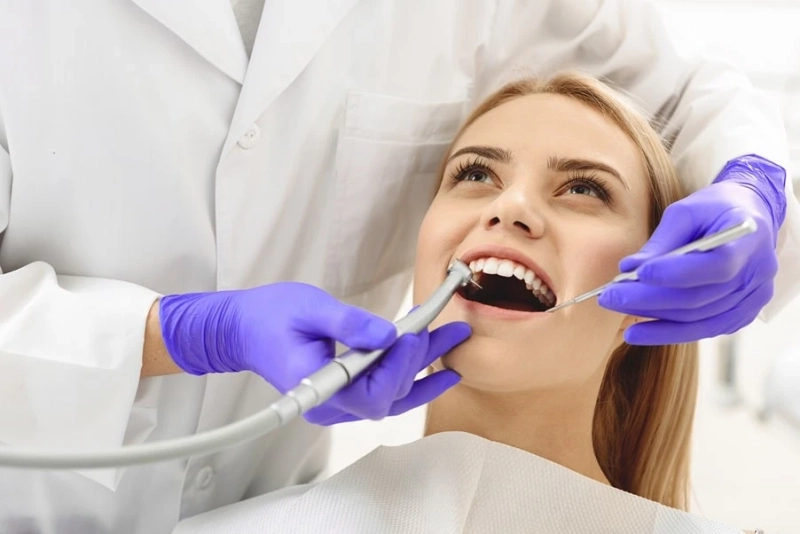Fluoride Treatment: Your Smile’s Superhero
Now, imagine fluoride as the armored suit that your teeth have to ward off contact with sugar in the mouth, exposure to acid, and formation of decay. Fluoride will harden and also repair the damage in your enamel even before it can form a cavity. It is very fast and also painless. At Butternut Dentistry, we will strive to give you the finest fluoride treatment and dentistry care services to ensure that you maintain a healthy and strong smile.
What is fluoride treatment?
Fluoride is a natural mineral that is found in salt, water, and many foods. In preventive dentistry, healthcare uses fluoride to protect teeth from cavities and make teeth clean.
The best fluoride treatment makes enamel strong and even reverses its early damage before it can turn into a cavity. It is quick, pain-free, and very efficient. It protects your teeth, keeps them healthy, and gives them a strong and white smile.
Benefits of fluoride treatment
Strengthen enamel: Makes the tooth more resistant to decay and acidic erosion and generates resistance to tooth acidic erosion.
Fight against harmful bacteria: Combats bad bacteria and limits the capacity of bacteria that cause cavities to manufacture acids.
Tooth decay: Prevent early tooth decay and help in remineralizing soft areas on enamel before the formation of cavities is complete.
Safe for all: It is safe to use for all ages. Works well in children, adults, and older people in different stages of dental health.
Long-term oral health: Enhancing healthy teeth over a long-term period reduces the chances of cavities and sensitivity of teeth in the long run.
Types of fluoride
Fluoride is greatly present in common sources such as food, water, and toothpaste, as well as mouthwash. Over the counter products usually have low amounts of fluoride, whereas those with prescription strength, such as tablets or concentrated rinse, can be acquired through a healthcare provider in the event of those more susceptible to tooth decay.
- Foam: It is squirted into a tray that should perfectly fit inside your mouth and which is kept on top of the teeth within a number of minutes.
- Varnish: Is painted with the tooth and dries rapidly. It can be particularly helpful to young children and those that have sensitive teeth.
- Gel: This can be applied by brush or applied in a tray, stimulating concentrated exposure over a short time to fluoride.
What happens during a professional fluoride treatment?
- Preliminary Examination and Cleaning: Your dentist/hygienist will administer some preliminary examinations of your teeth and gums and do a cleaning of your teeth to dislodge the plaque to enhance the absorption of fluoride.
- Fluoride Application: Depending on the requirements, concentrated fluoride (gel, foam, varnish, or rinse) is applied onto the teeth with the help of a brush, swab, tray, or mouthwash.
- Quick Absorption: This fluoride is not washed away right now, and instead, it takes some minutes so that it can harden your teeth.
- What to do after treatment: It is advisable to be told not to eat, drink, or rinse for about half an hour to allow the fluoride to highly penetrate and protect the teeth.
- Health History Review: Your dentist will ask about your medical background so he or she can be sure of both the safety and efficacy of treatment for you.
At what age is fluoride intake most important?
According to Butternut Dental Care research, the intake of fluoride should be critical in early childhood, especially at ages between 6 months and 16 years. It is the most crunch time when both the primary and permanent teeth are developing and coming out.
- Infants (6 months and above): It is at this stage that the baby teeth start to appear. With fluoride, young teeth enamel strengthens and gives resistance to cavities at an early kiddo age.
- Children (2 to 8 years): Permanent teeth are still developing beneath the gums and start breaking. Hotels need fluoride so that they could become robust and decay less easily.
- Teens (age 16 and down): The wisdom teeth, as the last molars, are not yet grown. Full protection is achieved when fluoride is constantly taken during these later stages.
What is the cost of the treatment?
The price of professional and the best fluoride treatment may change depending on where you live, the provider, and whether you have dental insurance.
- Without insurance: Filling the holes with fluoride body parts is normally priced at $20-$50 per visit.
- Without insurance: Most insurance issues on children and even some on adults (primarily due to high-risk patients of cavities). During such situations, you can pay little or nothing out of pocket.
- Fluoride pediatric therapy: It is usually part of a regular dental check-up of children, especially when prescribed at an interval of 3-6 months.
5 Precautions & Aftercare tips for treatment
- Do not eat or drink for 30 minutes after the treatment so that it can be absorbed.
- Avoid brushing or flossing for 4 to 6 hours in case a fluoride varnish was used (except on the instructions of your dentist).
- Avoid taking hot foods or drinks, as they can dissolve the fluoride layer and interfere
- Remain on soft foods for the rest of the day to avoid scraping the fluoride off your teeth.
- Do not use fluoride-containing products (mouthwash or toothpaste) until the next day unless instructed.
FAQs
What is the right amount of fluoride taken by a person?
The proper level of fluoride varies on exposure and age. Adults should take about 3-4 mg daily. Children have a lower intake requirement, averaging about 0.5 or 1 mg per day, according to age. One should not consume more of this to have dental fluorosis or any other health-related issues.
Is fluoride toxic?
The correct use of fluoride is safe in low doses. But too much of it may lead to oral and bone disorders. Normal use is not expected to be toxic, and it normally happens as a result of ingesting high doses.
What happens during fluoride treatment?
We use high-concentration fluoride at Butternut Dental Care, and this is done by applying it in gel, foam, rinse, or in the form of a varnish, and this makes teeth strong and prevents decay. The treatment also aids in undoing early tooth damage, and this is helped by the emergency package being quick and painless.
What is the level of fluoride in tap water?
The fluoride content of your water will be indicated in your local water utility's annual report of water quality or on their website.



